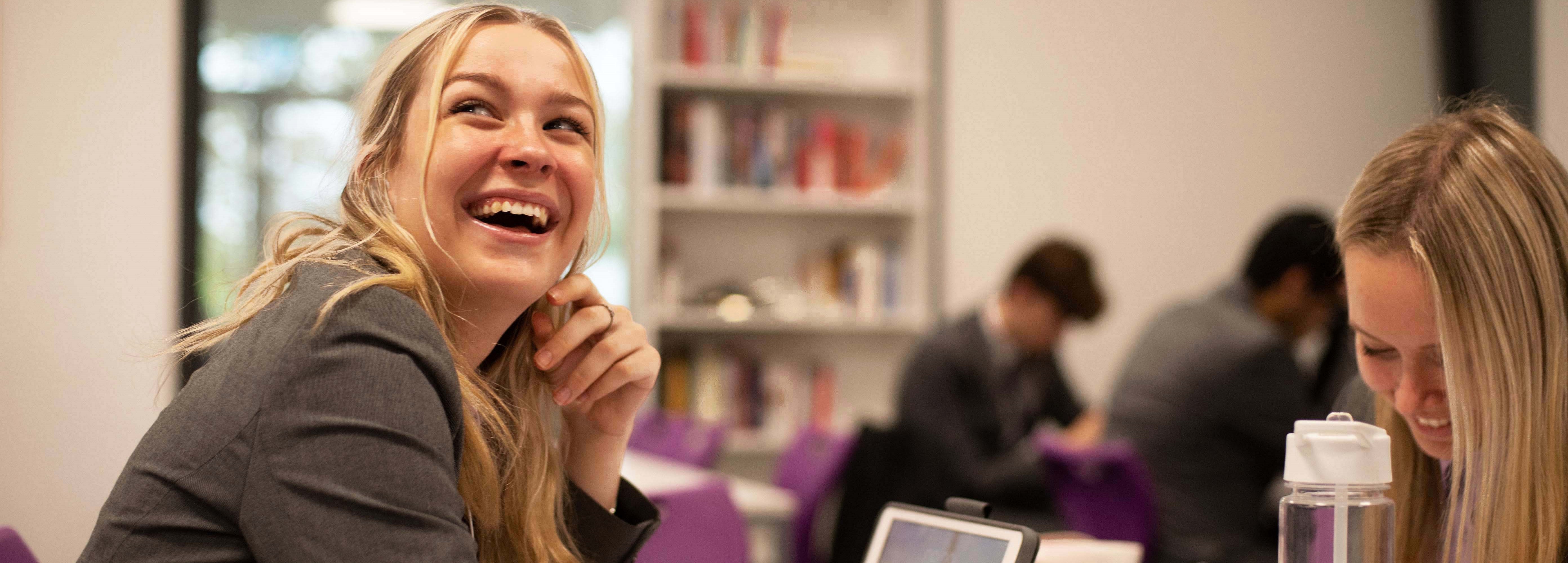Sixth Formers are the student leaders within our school. As such, we expect them not only to take responsibility for their own learning and development, but to share with staff some of the responsibility for our thriving Christian community. We expect them to choose a responsible role or post that serves the school as a whole and undertake training for that role during our Sixth Form induction. For example, playing a regular role in running Collective Worship for the junior years, acting as a reading partner or mentor for a younger student or sharing with the staff the leadership of a club or society or school event. More can be read about these examples on the mentoring and volunteering pages.
Other examples of how Sixth Form students develop their characters through taking responsibility include:
- Prefects – All Sixth Form students are prefects. They have the responsibility of performing duties at lunch time, welcoming guests to school events, supporting during whole-school gatherings (such as Eucharists), ensuring new students in all year groups feel welcome, having significant roles on Sports Day and much, much more.
- Senior Prefects – Each year, Prefects can apply to take on a more senior position of Head Boy, Head Girl or one of four Deputy Heads. They have to have demonstrated a high level of commitment to being a Prefect in the first half of Year 12 and then write a formal letter of application. Students who are shortlisted are then interviewed by two different panels and deliver a presentation in front of members of staff. The six successful students then lead the Prefects for the next year, undertaking a great deal of organisation, including managing the rota for Prefect duties, being second to only the Head of PE in arranging Sports Day and – importantly! – doing everything regarding the Year 13 Prom. They also represent Becket Keys at important events and welcome dignitaries to the school.
- House Captains – The House Captain roles are varied and vast as they help run extremely important areas of the school. House Captains develop inter-House competition across all year groups, are involved in the work Becket Keys does with charities and mentor younger students when needed. This role develops many different skills and provides Sixth Form students with opportunities to work closely with their peers in a close-knit team.
- Charities Committee – The Charities Committee is comprised of the House Captains and other members of the Sixth Form. It is very successful and raises thousands of pounds a year. Students are involved in planning, publicising, organising and running whole school charity events. This means that they work closely with lead staff, other teachers, peers and younger students from all year groups. They meet fortnightly, unless events demand additional meetings, and they then work with each other to action the decisions of the meeting.
- Sixth Form Council – Each tutor group provides two students to represent them on the Sixth Form Council. This is the forum during which an open discussion is had about what is going well in the Sixth Form and what could be improved. These students have the responsibility of ensuring that their tutor group’s views are shared accurately, contributing to the discussion thoughtfully and then feeding back to their peers afterwards. Most importantly, they have to take responsibility in working towards solutions and not just bringing problems: Sixth Form Council members are charged with collaborating with staff to ensure improvement. For example, when there were concerns over plastic use in the Deli, members had the responsibility of working with the catering company to help them reduce this.
Of course, all students are expected to take responsibility in other ways to help them develop their characters and prepare for life after school:
- Attending whenever possible – Unless there is a very good reason for not being in school, Sixth Formers are expected to attend every day. They are told to pretend that it is a job they are being paid to be at and would not be paid if they did not turn up – then make a responsible decision based on this.
- Being proactive – This is a crucial part of being in the Sixth Form! Students quickly come to understand that it is unlikely that something will happen for them as an individual unless they are proactive in asking for it. And, of course, when they ask for it, staff are always extremely willing to help! But unless a student asks for the extra practice paper, the help proofreading a letter of application or a new club to be organised, it might not happen. We encourage students to be proactive in order to prepare them for university or other destinations.
- Being punctual – There is rarely a valid excuse for lateness, whether this be first thing in the morning or to lessons. Again, students are coached so that they are ready to impress when they start work in the future.
- Managing workload – On average, students are in lessons for 15 hours a week and tutorials for 2 hours a week, with another 2 hours a week being for volunteering and enrichment. Out of approximately 34 hours in a school week, this sounds like there is lots of time to spare – at least it does until the 15 hours of homework, 9 hours of revision and ongoing super-curricular studies are counted as well! Of course, this is on top of any ongoing coursework, plus any private commitments such as hobbies, employment, driving lessons and socialising. Students are coached through adapting to this and managing all their different commitments, both to help them during their A Level studies and in readiness for increased freedom after they leave school.
